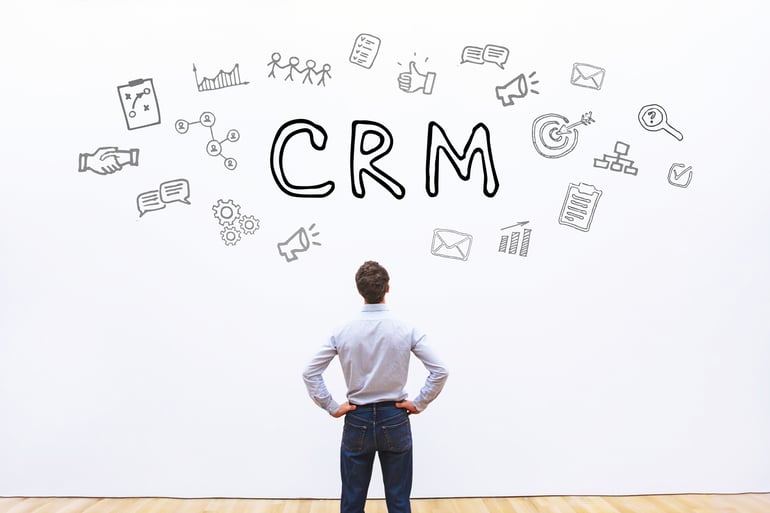4 Tips to Purchase CRM Software That Will Work for Your B2B Business

Customer Relationship Management software (CRM) is one of the most important purchases that can assist your sales process or hinder it, causing lost opportunities and lost revenue by impeding your sales force with time consuming or useless functionality that doesn’t mirror their sales process.

Unfortunately, too many companies end up purchasing CRM software that isn't the right fit for them. It's either too cumbersome and doesn't get used, or doesn't have the appropriate functionality for the buying process, or some other issue.
Here are 4 things to look for in order to purchase CRM software that work well for your business:
1. Flexibility
If you've mapped out your sales process from the time a contact becomes a lead through to the sale or post-sale implementation and support (if necessary in your business), you have an idea of what information you need to collect in your CRM and when.
Now take a few more minutes to determine what questions you have had in your business that you weren’t able to answer before. Can you gather data through your CRM to help you answer those questions in time?
Now map that information into the features and functionality of the CRM. Can you customize fields to support your needs? Do you need more than one type of sales pipeline (ie – for new business or renewing existing business). \ Which other software do you need to connect to for your business? Is there an API for that software or would linking these two types of software require additional customization? What data do you need to collect to report on your key performance indicators? At this point you will now have a sense of how the CRM matches your needs.
Bonus Tip: Check if the software provider offers tiered pricing so that your subscription can grow with your needs. The needs you have today could evolve so you want to be sure your software can manage evolving and growing with you. Many providers have a Starter-Professional-Enterprise tiered system of functionality and price so be sure you buy for what you need today with an eye for what you might need for the future.
2. Post-Sale Support
Be sure you understand the options available to you for post-sale support. That includes the initial implementation as well as a longer-term service plan. For implementation, refer back to how much customization you identified and determine which level of implementation support you might need. Sometimes 30 or 90 minutes is given for free but anything more than that is an additional cost, generally in a sliding scale dependent on what kind of support you need.
Please do not skip this step.
We see many instances of companies that skipped this step in their due diligence, which results in a tremendous amount of frustration - for both users and administration.
Many providers offer both free and paid levels of continuing support that provides faster, personalized or enhanced support for an additional cost. Ongoing support is always recommended. Over the lifetime of the CRM, you will have both new user and administrators and your needs will change. It will save a tremendous amount of time to access support in a timely fashion to answer one-off questions that come up. Be sure you investigate the options and select your service package knowing that it will be put to good use.
A reputable CRM provider will have online training to help you educate your users and enable them to learn more about certain areas of the software, depending on their needs. It is best if the online training requires passing a test or results in a certification process that can then become a requirement for holding the position or working at the company.
3. Reporting
The reporting module is one of the most critical when it comes to CRM systems. And yet it is often overlooked in the purchase process, with more attention paid to features and price.
Ask to see what reports are pre-built for you, to give you an idea of what kind of data the CRM developers thought was important to collect. Does it match your needs? Is it flexible? How easy it is to transform those reports into visually-appealing dashboards? Are dashboards even an available feature?
Now check to see how difficult it is to build a custom report. Make sure these two steps are included in your demonstration. Double check if there is additional cost for reporting or dashboard functionality or any limit on reports that can be created.
Most sales people will want to build their own reports customized to their own territory, so be sure you have purchased enough reports to provide that as well as the typical reports such as pipeline reviews, win-loss analysis and whatever else you need to track.
4. Partners
The more reputable and established software companies have a long list of other software companies that they easily connect to through an API. Be sure your software is on that list. Know that anything missing requires custom development which comes at a higher cost to you as well as additional time that could slow down your implementation.
Finally, it might be more convenient for you to work with a local partner on implementation if the CRM software company is located in a different country or time zone than you. Most companies have a partner database that has strict rules for inclusion that typically include certification, years of experience and more. Use that database to find a partner that offers the services you need.
Summary
If all of this seems overwhelming, use a partner to help guide you through your initial purchase and ensure that this important decision you have made for your business brings the results you desire. At Mezzanine, we offer these services you can read more about here.
.png?width=2361&height=488&name=Mezzanine%20Logo_Horiz_RGB_on%20blue%20(1).png)
